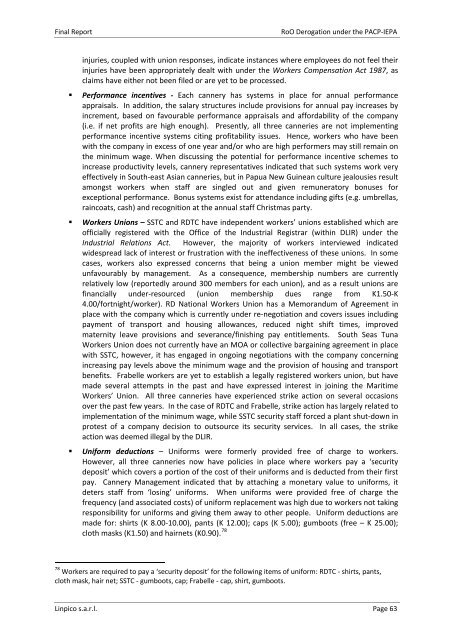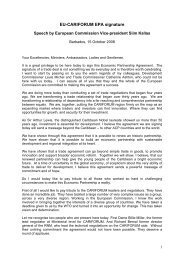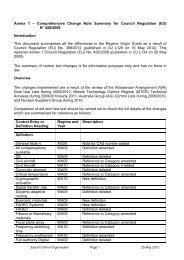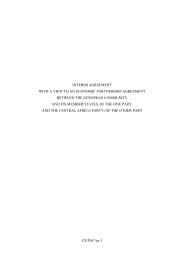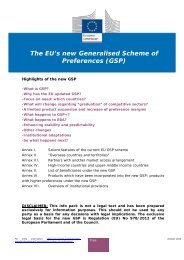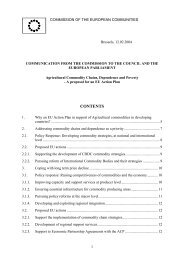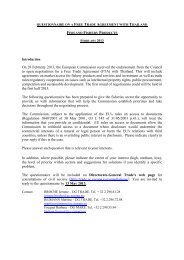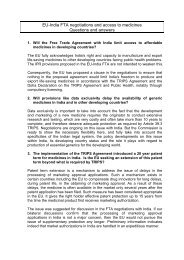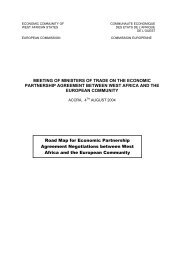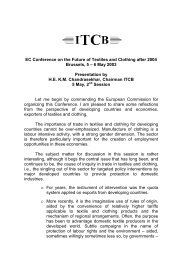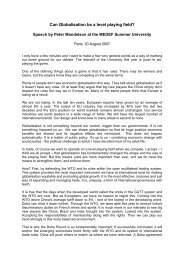Report on the Implementation of the derogation to ... - Trade Websites
Report on the Implementation of the derogation to ... - Trade Websites
Report on the Implementation of the derogation to ... - Trade Websites
You also want an ePaper? Increase the reach of your titles
YUMPU automatically turns print PDFs into web optimized ePapers that Google loves.
Final <str<strong>on</strong>g>Report</str<strong>on</strong>g><br />
RoO Derogati<strong>on</strong> under <strong>the</strong> PACP-IEPA<br />
injuries, coupled with uni<strong>on</strong> resp<strong>on</strong>ses, indicate instances where employees do not feel <strong>the</strong>ir<br />
injuries have been appropriately dealt with under <strong>the</strong> Workers Compensati<strong>on</strong> Act 1987, as<br />
claims have ei<strong>the</strong>r not been filed or are yet <strong>to</strong> be processed.<br />
• Performance incentives - Each cannery has systems in place for annual performance<br />
appraisals. In additi<strong>on</strong>, <strong>the</strong> salary structures include provisi<strong>on</strong>s for annual pay increases by<br />
increment, based <strong>on</strong> favourable performance appraisals and affordability <strong>of</strong> <strong>the</strong> company<br />
(i.e. if net pr<strong>of</strong>its are high enough). Presently, all three canneries are not implementing<br />
performance incentive systems citing pr<strong>of</strong>itability issues. Hence, workers who have been<br />
with <strong>the</strong> company in excess <strong>of</strong> <strong>on</strong>e year and/or who are high performers may still remain <strong>on</strong><br />
<strong>the</strong> minimum wage. When discussing <strong>the</strong> potential for performance incentive schemes <strong>to</strong><br />
increase productivity levels, cannery representatives indicated that such systems work very<br />
effectively in South-east Asian canneries, but in Papua New Guinean culture jealousies result<br />
am<strong>on</strong>gst workers when staff are singled out and given remunera<strong>to</strong>ry b<strong>on</strong>uses for<br />
excepti<strong>on</strong>al performance. B<strong>on</strong>us systems exist for attendance including gifts (e.g. umbrellas,<br />
raincoats, cash) and recogniti<strong>on</strong> at <strong>the</strong> annual staff Christmas party.<br />
• Workers Uni<strong>on</strong>s – SSTC and RDTC have independent workers’ uni<strong>on</strong>s established which are<br />
<strong>of</strong>ficially registered with <strong>the</strong> Office <strong>of</strong> <strong>the</strong> Industrial Registrar (within DLIR) under <strong>the</strong><br />
Industrial Relati<strong>on</strong>s Act. However, <strong>the</strong> majority <strong>of</strong> workers interviewed indicated<br />
widespread lack <strong>of</strong> interest or frustrati<strong>on</strong> with <strong>the</strong> ineffectiveness <strong>of</strong> <strong>the</strong>se uni<strong>on</strong>s. In some<br />
cases, workers also expressed c<strong>on</strong>cerns that being a uni<strong>on</strong> member might be viewed<br />
unfavourably by management. As a c<strong>on</strong>sequence, membership numbers are currently<br />
relatively low (reportedly around 300 members for each uni<strong>on</strong>), and as a result uni<strong>on</strong>s are<br />
financially under-resourced (uni<strong>on</strong> membership dues range from K1.50-K<br />
4.00/fortnight/worker). RD Nati<strong>on</strong>al Workers Uni<strong>on</strong> has a Memorandum <strong>of</strong> Agreement in<br />
place with <strong>the</strong> company which is currently under re-negotiati<strong>on</strong> and covers issues including<br />
payment <strong>of</strong> transport and housing allowances, reduced night shift times, improved<br />
maternity leave provisi<strong>on</strong>s and severance/finishing pay entitlements. South Seas Tuna<br />
Workers Uni<strong>on</strong> does not currently have an MOA or collective bargaining agreement in place<br />
with SSTC, however, it has engaged in <strong>on</strong>going negotiati<strong>on</strong>s with <strong>the</strong> company c<strong>on</strong>cerning<br />
increasing pay levels above <strong>the</strong> minimum wage and <strong>the</strong> provisi<strong>on</strong> <strong>of</strong> housing and transport<br />
benefits. Frabelle workers are yet <strong>to</strong> establish a legally registered workers uni<strong>on</strong>, but have<br />
made several attempts in <strong>the</strong> past and have expressed interest in joining <strong>the</strong> Maritime<br />
Workers’ Uni<strong>on</strong>. All three canneries have experienced strike acti<strong>on</strong> <strong>on</strong> several occasi<strong>on</strong>s<br />
over <strong>the</strong> past few years. In <strong>the</strong> case <strong>of</strong> RDTC and Frabelle, strike acti<strong>on</strong> has largely related <strong>to</strong><br />
implementati<strong>on</strong> <strong>of</strong> <strong>the</strong> minimum wage, while SSTC security staff forced a plant shut-down in<br />
protest <strong>of</strong> a company decisi<strong>on</strong> <strong>to</strong> outsource its security services. In all cases, <strong>the</strong> strike<br />
acti<strong>on</strong> was deemed illegal by <strong>the</strong> DLIR.<br />
• Uniform deducti<strong>on</strong>s – Uniforms were formerly provided free <strong>of</strong> charge <strong>to</strong> workers.<br />
However, all three canneries now have policies in place where workers pay a ‘security<br />
deposit’ which covers a porti<strong>on</strong> <strong>of</strong> <strong>the</strong> cost <strong>of</strong> <strong>the</strong>ir uniforms and is deducted from <strong>the</strong>ir first<br />
pay. Cannery Management indicated that by attaching a m<strong>on</strong>etary value <strong>to</strong> uniforms, it<br />
deters staff from ‘losing’ uniforms. When uniforms were provided free <strong>of</strong> charge <strong>the</strong><br />
frequency (and associated costs) <strong>of</strong> uniform replacement was high due <strong>to</strong> workers not taking<br />
resp<strong>on</strong>sibility for uniforms and giving <strong>the</strong>m away <strong>to</strong> o<strong>the</strong>r people. Uniform deducti<strong>on</strong>s are<br />
made for: shirts (K 8.00-10.00), pants (K 12.00); caps (K 5.00); gumboots (free – K 25.00);<br />
cloth masks (K1.50) and hairnets (K0.90). 78<br />
78 Workers are required <strong>to</strong> pay a ‘security deposit’ for <strong>the</strong> following items <strong>of</strong> uniform: RDTC - shirts, pants,<br />
cloth mask, hair net; SSTC - gumboots, cap; Frabelle - cap, shirt, gumboots.<br />
Linpico s.a.r.l. Page 63


